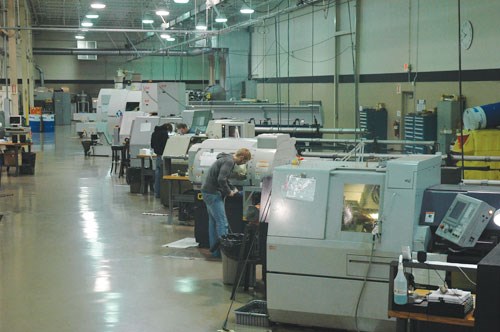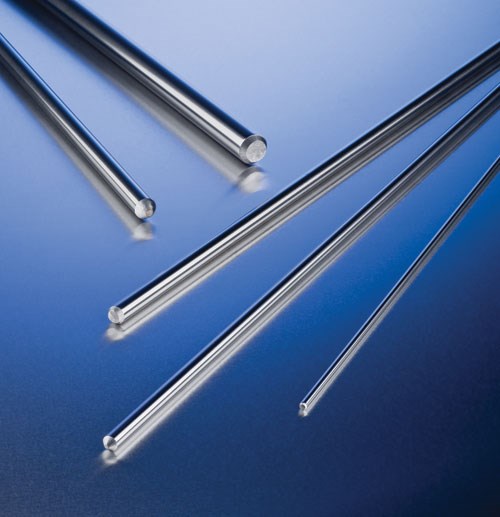Switching Material Improves Productivity, Bar None
Serving the exacting and specialized requirements of the medical implant industry requires manufacturers to not only use the most precise, state-of-the-art metalworking equipment, but also high quality raw materials, including precision ground bar capable of offering tight dimensional tolerances and exceptional diameter uniformity.
Serving the exacting and specialized requirements of the medical implant industry requires manufacturers to not only use the most precise, state-of-the-art metalworking equipment, but also high quality raw materials, including precision ground bar capable of offering tight dimensional tolerances and exceptional diameter uniformity.
Hammill Medical division of Hammill Manufacturing Co., Maumee, Ohio, a contract implant producer that specializes in high precision products such as bone screws, spinal implants, femoral knee joints and fixation systems, began using titanium Ultrabar small diameter “extra-precision” ground titanium bar on its CNC Swiss-type screw machines a little more than a year ago. That switchover has resulted in efficiency improvements of 25 percent or more. Titanium Ultrabar, developed by Dynamet Inc., a subsidiary of Carpenter Technology Corp., is known for offering tight dimensional tolerances and exceptional diameter uniformity, meeting the demanding needs of manufacturers who make precision parts using Swiss-type screw machines.
Demand for medical implants, especially spinal implants, has been growing at a rapid rate for at least the past 5 to 7 years—approximately 10 percent a year—according to the Millennium Research Group. Demand has continued to grow, albeit at a somewhat lower rate, even during the current economic downturn, given that many implants—especially spinal implants—are not necessarily elective procedures.
Hammill Medical does contract business for medical device manufacturers and has 12 Swiss-type sliding headstock machines, which are used around the clock. In Swiss-type machines, the high precision titanium bar must spin at a high rpm while traveling through a guide bushing as tools are indexed to form high precision components for critical applications. Roundness, straightness and size consistency from bar end to bar end and lot to lot are the features that Hammill was seeking.
Accuracy is very important to Hammill Medical, as about 65 percent of the implants it machines with Swiss lathes are bone screws. Bone screws need to be very precisely machined and exhibit extreme tolerances. “Each part in the stack-up assembly that is eventually implanted in the vertebrae has to be sized perfectly so they not only lock together with ease, but they also have to maintain that holding power throughout the life of the implant,” Jeff McFarland, the company’s production supervisor, explains.
Prior to using titanium Ultrabar, Hammill had been using precision ground titanium bar with the same material composition, both physically and chemically. Moving to titanium Ultrabar provided the efficiency gains that the company was looking for by reducing intermittent adjustments and increasing throughput per shift.
“That was a major gain for us,” Mr. McFarland says. “When productivity increases, it means we need to get more from our machines and to optimize our capacity, which, in turn, allows us to be a reliable supplier to our customers,” he explains.
Prior to switching to Ultrabar, Mr. McFarland says the company researched various machine technologies and the possible modification to existing equipment, but decided that upgrading to Ultrabar would be the best option for achieving its manufacturing goals. Efficiency improvements of 25 percent or more were achieved on certain jobs.
In addition, Mr. McFarland says operators spend less time on material setup and process optimization and can focus on other tasks. “Switching to Ultrabar cost us more in material, but the higher cost is more than offset by the increase in productivity and capacity,” he says.
Through a special grinding process, this titanium bar is produced to much tighter specifications, including tighter diameter tolerances, roundness and straightness, and has better overall size variability than conventionally ground precision bar, says Thomas U. Zuccarini, Dynamet’s market manager for medical and consumer.
Best suited for use in Swiss-type machine tools, the bar was developed approximately 3 years ago to meet the needs of certain customers who were taking conventional precision bar to custom grinding houses to create the kind of dimensions that are now available with titanium Ultrabar. Mr. Zuccarini says, “We decided to provide a bar that satisfied our customers’ needs without the need for them to go outside for finishing services.”
According to Mr. Zuccarini, acceptance of this bar has been better than expected in medical implant and dental applications. “Companies seeking more productivity, better yields, and faster setups for higher quality and more complex parts gravitate from standard bar products to Ultrabar.”
While it is primarily chosen for a variety of medical and dental implant components, Mr. Zuccarini says the bar could also be used in other markets that require very tight dimensions and a high quality surface finish, possibly the high-end watch market for internal titanium components.
Hammill uses Ultrabar as large as 12.7-mm (0.500-inch) diameter Ti 6Al-4V. It is also available in as small as 3-mm diameter (0.118 inch) and in many other grades of medical titanium, including Ti 6Al-4V ELI, Ti 6Al-7Nb, Ti CP-Grade 1, Ti CP Grade 2, Ti CP-Grade 3, Ti CP-Grade 4 and Ti 15Mo in lengths as long as 4.26 meters (14 ft.).
“Throughput is critical to our company,” Mr. McFarland says. “Ultrabar gives us the assurance that we can continually meet our customers’ specifications and delivery timeframe. When making a precision part, you need to start with a high quality raw material.”
Related Content
How Small Machine Shops Can Fight Supply Chain Problems
Supply chain disruptions are still presenting challenges in manufacturing. This article examines the effects on aerospace, automotive and medical industries. It also covers ways that machine shops can be successful securing work despite the challenges created by the supply chain.
Read MoreThe Value of Mass Finishing, Shot Blasting for Aerospace and Medical Applications
The choice between mass finishing and shot blasting for CNC-machined parts depends on the specific requirements of the application.
Read MoreSandvik Coromant Inserts Provide Stable Turning of Aerospace Components
The new insert grades GC1205 and GC1210 cover a large application area within last-stage machining and intermediate-stage machining when turning aerospace engine components.
Read MoreJR Machine Launches Expansion Strategy, Hires New CEO
An investment from Schneider Resources Holding positions JR Machine to grow in emerging markets such space exploration and green energy.
Read MoreRead Next
Swiss Shop Serves Medical And More
For more than 20 years this Chicagoland shop has been a supplier to one of the world’s largest manufacturers of medical devices. It’s a relationship that is built on mutual trust, consistent performance and a long-term view of the business of manufacturing. It’s also about properly applied technology.
Read MoreA Tooling Workshop Worth a Visit
Marubeni Citizen-Cincom’s tooling and accessory workshop offers a chance to learn more about ancillary devices that can boost machining efficiency and capability.
Read More5 Aspects of PMTS I Appreciate
The three-day edition of the 2025 Precision Machining Technology Show kicks off at the start of April. I’ll be there, and here are some reasons why.
Read More
























